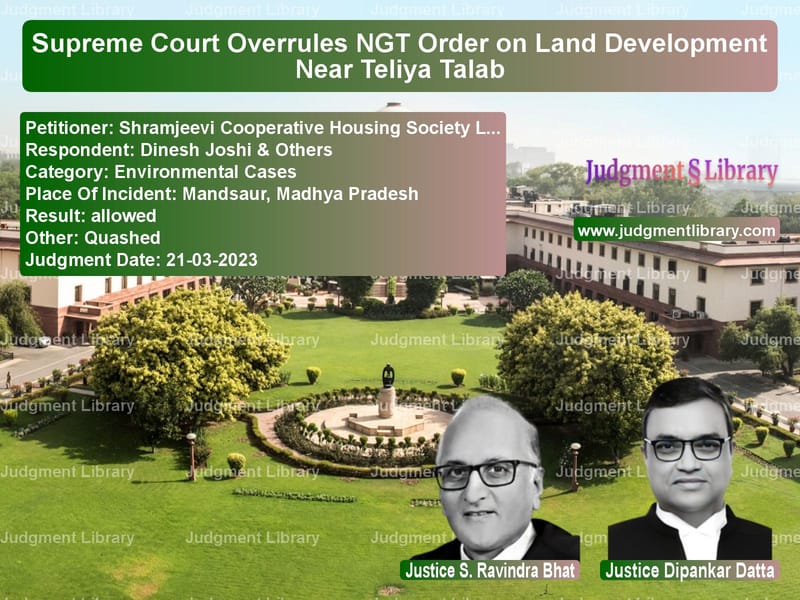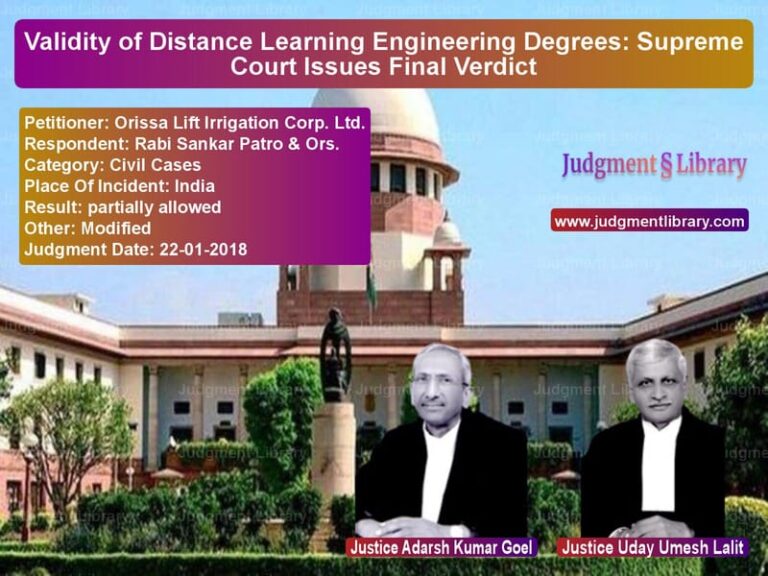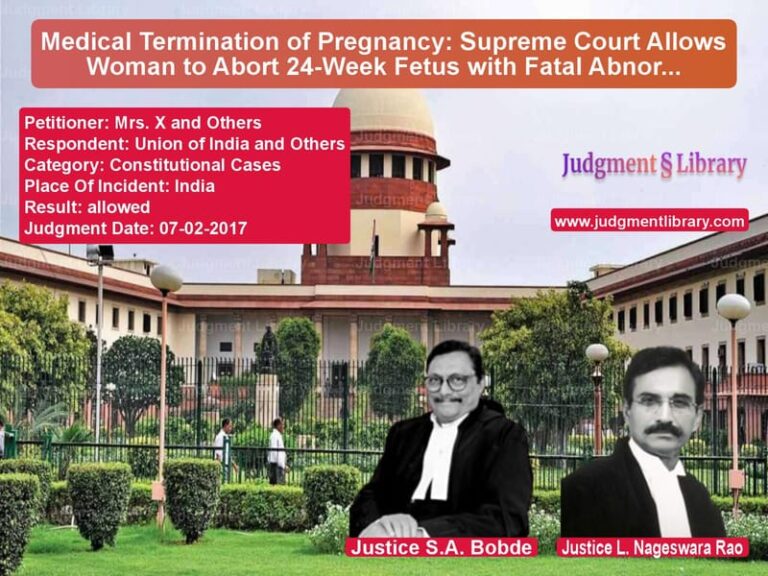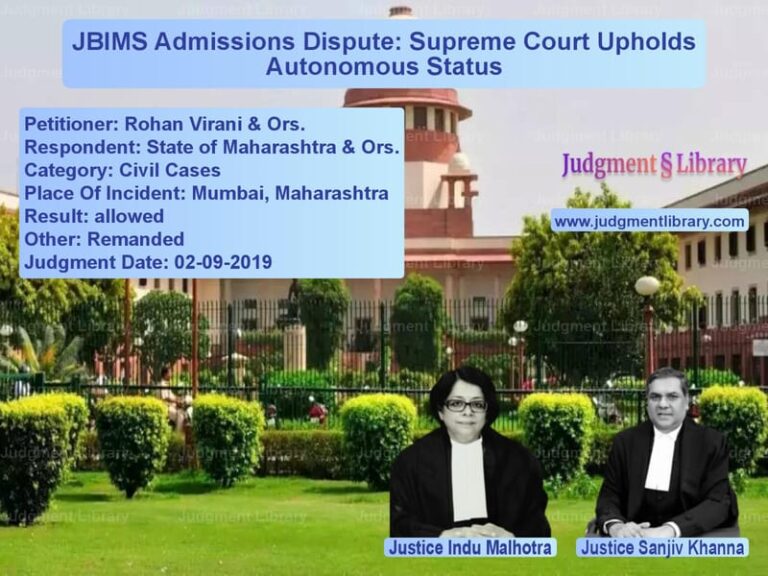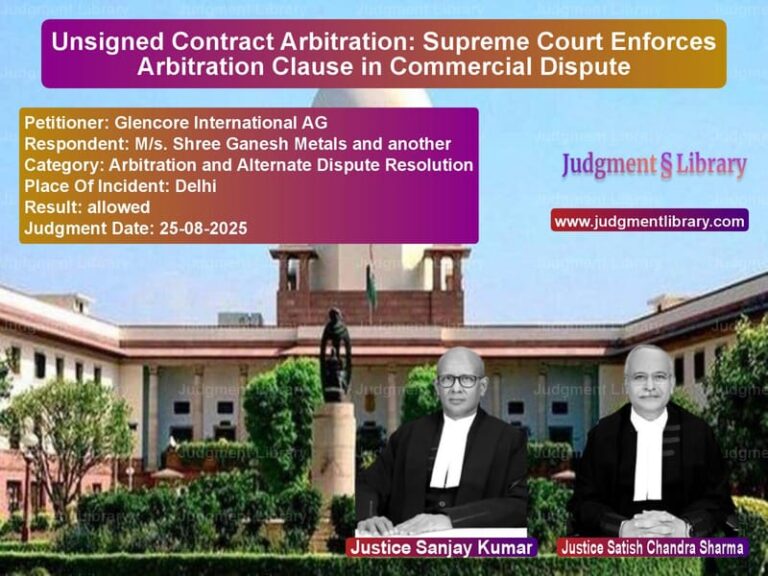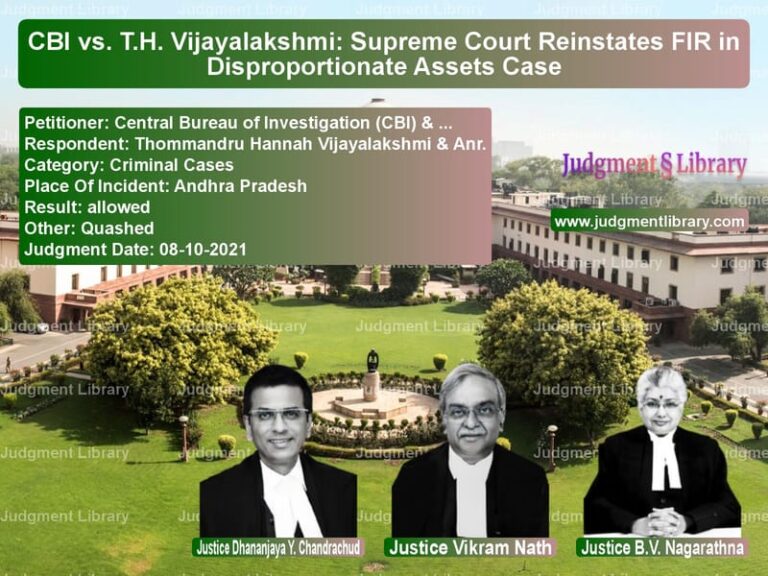Supreme Court Overrules NGT Order on Land Development Near Teliya Talab
The Supreme Court of India has delivered a significant ruling in the case of Shramjeevi Cooperative Housing Society Ltd. v. Dinesh Joshi & Others, overturning the National Green Tribunal’s (NGT) orders that restricted construction near Teliya Talab in Mandsaur, Madhya Pradesh. The Court emphasized the principle of finality in judicial decisions and ruled that prior decrees recognizing landowners’ rights cannot be revisited without valid legal grounds.
The ruling reinforces the importance of legal certainty and prevents arbitrary restrictions on land development based on flawed or incomplete environmental assessments.
Background of the Case
The case arose from a series of orders by the National Green Tribunal (NGT), which restricted the Nagar Palika Parishad, Mandsaur, from granting construction permits near Teliya Talab, a man-made lake. The orders were issued in response to an application filed by Dinesh Joshi, who claimed that land development near the lake was reducing the water body’s surface area and polluting it with untreated waste.
The NGT based its decisions on a revenue trace map that indicated certain lands fell within the maximum water level (MWL) and full water level (FWL) of the lake. However, affected landowners, including the Shramjeevi Cooperative Housing Society, challenged the orders, arguing that they had obtained legitimate construction approvals decades earlier and that their land was outside the water body’s boundaries.
Legal Battle and High Court Rulings
The appellants contended that:
- Their land was lawfully acquired and developed under the Mandsaur Development Plan, 2001, which designated green areas near the lake but allowed construction beyond a public road.
- The NGT failed to consider that prior litigation had already established their property rights.
- The Parishad and Town and Country Planning Department (TCD) had granted construction permits based on accurate surveys.
- The NGT orders relied on an erroneous map that was not a final or approved document.
The NGT dismissed their review petitions and reaffirmed its orders, prompting the affected landowners to approach the Supreme Court.
Arguments of the Parties
Petitioner’s Arguments (Shramjeevi Cooperative Housing Society Ltd. and Others)
- The NGT orders violated the principle of finality in judicial decisions, as prior court rulings had already settled their land rights.
- The restrictions were based on an incorrect and unverified map that had not been approved by the revenue authorities.
- The NGT failed to provide an opportunity for affected landowners to present their case before imposing development restrictions.
- Their land had been legally acquired decades ago, and they had secured approvals following due process.
Respondent’s Arguments (Dinesh Joshi & Others)
- The NGT orders were justified to protect the environment and prevent further encroachment on the water body.
- The revenue trace map used by the NGT indicated that construction would fall within the MWL and FWL of the lake.
- The Parishad and state authorities had been negligent in enforcing environmental regulations.
Key Observations of the Supreme Court
The Supreme Court ruled in favor of the petitioners and set aside the NGT’s orders. The key observations included:
- Finality of Judicial Decisions: The Court emphasized that prior judicial rulings in favor of landowners, including decisions from the High Court and lower courts, could not be reopened without a valid legal basis.
- Errors in NGT’s Approach: The NGT failed to consider critical documents, including the Mandsaur Development Plan, which had already established the land use regulations in the area.
- Flawed Basis for Restrictions: The Court noted that the map relied upon by the NGT was a proposed document and not a final, approved survey.
- Violation of Natural Justice: The Court criticized the NGT for failing to provide an opportunity for affected landowners to be heard before restricting construction.
Final Ruling
The Supreme Court ruled:
- The NGT’s restrictions on land development near Teliya Talab were quashed.
- The rights of Shramjeevi Cooperative Housing Society Ltd. and other petitioners were upheld.
- The NGT must reconsider the issue in a fresh hearing in O.A. No. 70/2022, ensuring that accurate boundaries of the lake are determined by a properly constituted committee.
- A committee comprising representatives from the Revenue Department, TCD, Parishad, and Water Resources Department will conduct a fresh survey to determine the exact boundaries of the lake.
Accordingly, the appeal was allowed, and the Supreme Court directed the authorities to grant construction permissions based on the revised survey.
Implications of the Judgment
This ruling has far-reaching implications for environmental law, land use planning, and property rights:
- Strengthens Legal Certainty: The judgment reinforces that once land rights are adjudicated, they cannot be arbitrarily overturned by regulatory bodies.
- Prevents Regulatory Overreach: The ruling ensures that development restrictions are imposed based on factual accuracy, not flawed assessments.
- Balances Environmental Protection with Property Rights: The Court acknowledged the importance of environmental conservation while ensuring that legitimate landowners are not unfairly deprived of their rights.
- Establishes Due Process in Environmental Cases: The judgment mandates that affected parties must be heard before restrictions are imposed.
Conclusion
The Supreme Court’s decision in Shramjeevi Cooperative Housing Society Ltd. v. Dinesh Joshi & Others sets an important precedent in balancing environmental protection with legal certainty. By ruling that prior judicial decisions on land ownership must be respected, the Court has reaffirmed the principle that property rights cannot be arbitrarily restricted.
This judgment underscores the importance of conducting accurate and transparent environmental assessments before imposing restrictions on land development. The decision protects landowners from regulatory overreach while ensuring that environmental concerns are addressed through proper legal channels.
Petitioner Name: Shramjeevi Cooperative Housing Society Ltd..Respondent Name: Dinesh Joshi & Others.Judgment By: Justice S. Ravindra Bhat, Justice Dipankar Datta.Place Of Incident: Mandsaur, Madhya Pradesh.Judgment Date: 21-03-2023.
Don’t miss out on the full details! Download the complete judgment in PDF format below and gain valuable insights instantly!
Download Judgment: shramjeevi-cooperati-vs-dinesh-joshi-&-other-supreme-court-of-india-judgment-dated-21-03-2023.pdf
Directly Download Judgment: Directly download this Judgment
See all petitions in Environmental Cases
See all petitions in Landlord-Tenant Disputes
See all petitions in Property Disputes
See all petitions in Judgment by S Ravindra Bhat
See all petitions in Judgment by Dipankar Datta
See all petitions in allowed
See all petitions in Quashed
See all petitions in supreme court of India judgments March 2023
See all petitions in 2023 judgments
See all posts in Environmental Cases Category
See all allowed petitions in Environmental Cases Category
See all Dismissed petitions in Environmental Cases Category
See all partially allowed petitions in Environmental Cases Category

